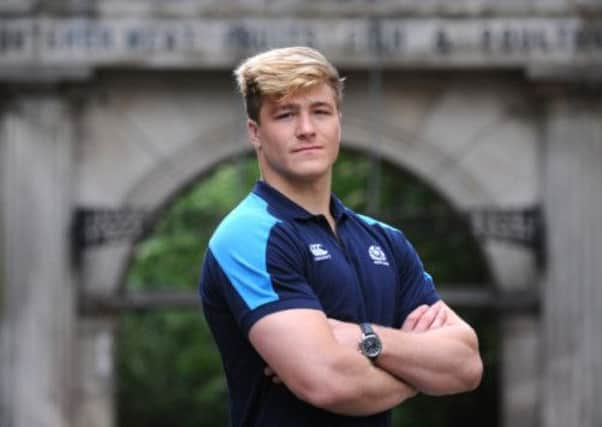David Denton poised to emerge from the shadows


Something similar goes on with coaches when they invite talented young players to take their first steps into international rugby. The coach knows that they have the skills, and often the uplifting confidence of youth, but they are unsure of how the brain will react to the mayhem of a Test match; the increased demands, intensity and pressure.
So it was when David Denton stepped into the Scotland team in 2011, a bullock of a back row who had come from Zimbabwe, via school in South Africa, to Edinburgh and, with a distinctive mop of blond hair, powerful trunk-like legs and innate confidence, climbed the stairs into the Murrayfield spotlight quickly. He followed another blond crusader in Richie Gray and suddenly Scotland appeared to have two forwards with the size, mobility and ball skills that rugby coaches had feared they would never see in navy.
Advertisement
Hide AdAdvertisement
Hide AdAnd just as Gray had a quieter second season, so Denton slipped into the shadows last term. Had he struggled with the limelight, or was this the latest case of “second season syndrome”?
“Yes, it maybe was,” he agrees, with refreshing candour. “I had a horrible run of luck with injuries, and I didn’t play well when I was fit at the start of the season, but I think that’s something I had to experience to learn from.
“Look, I understand that I will have a bad game here and there, but what I’ve learned is how to come back from it now. I wouldn’t say it has changed my thinking or my approach to things, but what it has done is show me what can happen. The way I’m playing now is relatively similar. I still focus a lot on what I’m good at and make sure I don’t forget that, but the way I hold myself around the pitch is very different.
“I feel more experienced because of last season, and a lot more confident on the field, and that’s important. When you are in tough situations it’s good to have a calm head and be able to think things through.”
He is still only 23 with many rugby lessons ahead, but we are seeing a maturing player. The reality of Denton’s development goes to the heart of Scottish rugby’s challenges, in the sense that in a country of just 12,000 or so adult rugby players and disparate levels of youth competition, one can rise to the top far quicker than in other rugby nations.
Only when one starts to play on the Test stage do frailties emerge that would have been exposed earlier in more congested rugby pathways. Denton and Gray are two of Scotland’s best young forwards and it will take some serious misfortune for them not to become stand-out performers across the decade, but even boys with long legs have to take small steps.
Helping Denton with those steps now is Alan Solomons, the former South Africa coach now at Edinburgh, and the first thing he agreed was to take Denton out of the standard protocol that forces Test players to be rested every five or six weeks.
“Last season was tough because I didn’t get a run of games,” Denton said. “That was the most frustrating thing; every time I felt I was coming back to form I had to take a few weeks or even a couple of months out. So I had no interest in getting rested this season and I played nine on the bounce for Edinburgh at the start of this season.
Advertisement
Hide AdAdvertisement
Hide Ad“He [Solomons] is putting a massive emphasis on me doing a lot more around the field. I think I need to use my size and athleticism in as many ways as I can, and I’m trying to make as big an impact in defence as I make in attack, and in particular at the breakdown.
“But it’s just great playing and it’s awesome to be back starting. There is a lot of competition at No 8, but I’ve got it this week and I’ve just got to make sure I do the best I can. I’m not looking far ahead. I want to play as well as I can and stand out, of course, but I just want to do my role in the team and try to get three wins. If we can come out of the autumn Tests successfully it will be awesome for Scottish rugby and for us as individuals.”
But, for all that coaches and scientists have discovered about the psychology and neurology of brains, they accept that they can never fully control youngsters nor know what they might do in any given situation. As Scotland open their autumn Test series, we should be thankful for that and the wonder and excitement that it generates.